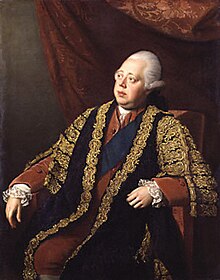Frederick, Lord North
|
The Right Honourable The Earl of Guilford KG PC |
|
|---|---|

Portrait by Nathaniel Dance
|
|
| Prime Minister of Great Britain | |
|
In office 28 January 1770 – 22 March 1782 |
|
| Monarch | George III |
| Preceded by | The Duke of Grafton |
| Succeeded by | The Marquess of Rockingham |
| Chancellor of the Exchequer | |
|
In office 11 September 1767 – 27 March 1782 |
|
| Monarch | George III |
| Prime Minister | The Duke of Grafton himself The Marquess of Rockingham |
| Preceded by | Charles Townshend |
| Succeeded by | Lord John Cavendish |
| Secretary of State for Home Affairs | |
|
In office 2 April 1783 – 19 December 1783 |
|
| Monarch | George III |
| Prime Minister | The Duke of Portland |
| Preceded by | Thomas Townshend |
| Succeeded by | The Earl Temple |
| Member of Parliament for Banbury |
|
|
In office 1754 – 4 August 1790 |
|
| Preceded by | John Willes |
| Succeeded by | Lord North |
| Personal details | |
| Born |
13 April 1732 Piccadilly, Middlesex, England |
| Died | 5 August 1792 (aged 60) Mayfair, Middlesex, England |
| Political party | Tory |
| Other political affiliations |
Whig |
| Spouse(s) | Anne Speke (m. 1756) |
| Children |
George, Lord North (1757–1802) Lady Catherine North (1760–1817) The Hon. Francis North (1761–1817) Lady Charlotte North (d. 1849) The Hon. Frederick North (1766–1827) Lady Anne North (d. 1832) |
| Alma mater | Trinity College, Oxford |
| Signature |  |
Frederick North, 2nd Earl of Guilford, KG PC (13 April 1732 – 5 August 1792), more often known by his courtesy title, Lord North, which he used from 1752 until 1790, was Prime Minister of Great Britain from 1770 to 1782. He led Great Britain through most of the American War of Independence. He also held a number of other cabinet posts, including Home Secretary and Chancellor of the Exchequer.
North's reputation among historians has swung back and forth. It reached its nadir in the late nineteenth century when he was depicted as a creature of the king and an incompetent who lost the American colonies. In the early twentieth century a revisionism emphasized his strengths in administering the Treasury, handling the House of Commons, and in defending the Church of England. Herbert Butterfield, however, argued that his indolence was a barrier to efficient crisis management; he neglected his role in supervising the entire war effort.
Lord North was born in London on 13 April 1732, at the family house at Albemarle Street, just off Piccadilly, though he spent much of his youth at Wroxton Abbey in Oxfordshire. North's strong physical resemblance to George III suggested to contemporaries that Prince Frederick might have been North's real father (and North the King's brother), a theory compatible with the Prince's reputation but supported by little real evidence. His father, the first Earl, was at the time Lord of the Bedchamber to Prince Frederick, who stood as godfather to the infant.
...
Wikipedia
